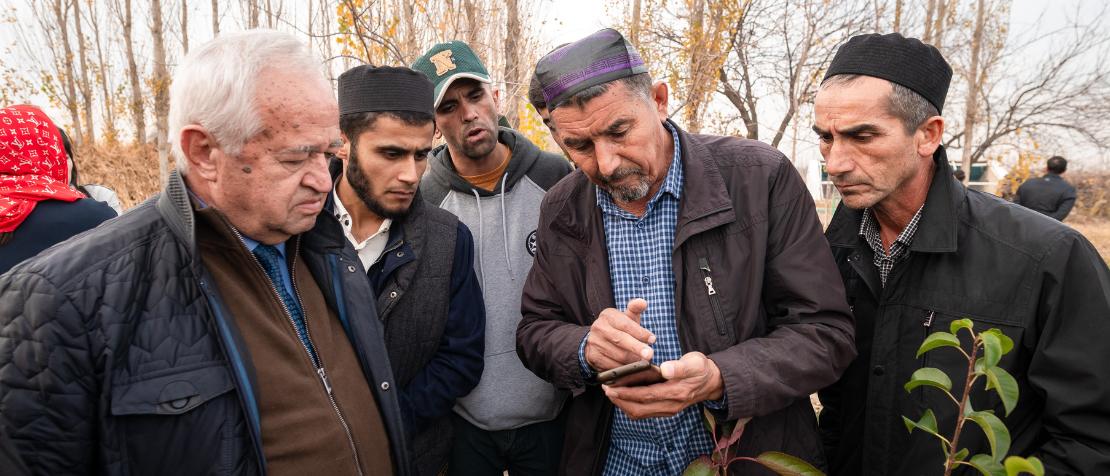Digital technologies make inroads into rural Uzbekistan and Tajikistan

©FAO
The Digital Villages Initiative of the Food and Agriculture Organization of the United Nations (FAO) is rolling out at full speed in Uzbekistan and Tajikistan. The Hack4DigitalVillages innovation challenge concluded at the end of November, awarding agricultural startups and innovators for creative technical solutions to agricultural challenges faced by rural Fergana. Simultaneously, two Memoranda of Understanding were officially signed to foster cooperation between Fergana valley (Uzbekistan) and Hisor valley (Tajikistan), solidifying the basis for knowledge exchange between rural communities of the two countries.
The villages and rural communities of Uzbekistan’s Fergana valley and Tajikistan’s Hisor valley have now become one step closer to start utilizing digital technologies for increased agricultural productivity and improved rural livelihoods, leveraging their local strengths, as envisaged by the Digital Villages Initiative.
The two villages signed the twinning cooperation agreements on 26 November, opening the way for an exchange of knowledge and good practices around the application of information and communication technologies in agriculture.
Inspired from the European Union’s approach, the Digital Villages Initiative twinning model embodies an approach of mutual enrichment through connecting rural communities and organizations from different regions or countries and encouraging them to share knowledge, experiences, and technologies.
Participating villages – Novkent and Yuksalish from Uzbekistan and Lolazor from Tajikistan – are gaining enhanced digital literacy and skills, particularly in agriculture, with an emphasis on empowering women and youth, while exploring funding and partnerships for sustainable village development.
“The Digital Villages Initiative is built on the needs of the communities, therefore, the priorities and issues of common interests have been defined by the villagers through joint workshops and brainstorming sessions,” explained Daniela Di Gianantonio, Digital Agriculture Team Leader at FAO. “We at FAO help them set the framework, where they are free to set their own agenda.”
Additionally, with FAO’s facilitation, the Fergana State University and Tajik Agrarian University have established cooperative activities in agricultural science through joint research, academic exchanges, and the development of joint academic programmes at various levels. As the first step, experts of the Tajik university will deliver lectures in Fergana this month.
Young innovators wanted
The closure of the "Hack4DigitalVillages" regional innovation challenge was held on 26 November in Fergana, Uzbekistan. The initiative aimed to address agricultural challenges faced by rural communities of Fergana by encouraging young people to develop digital solutions to solve the challenges faced by their own communities.
The challenge, organized by FAO and the OSCE Project Co-ordinator in Uzbekistan, with support from IT Park and the CGIAR Accelerate for Impact Platform, attracted a total of 244 applications. Out of these applicants, 36 teams were selected to test their digital solutions as solutions to issues related to greenhouse management, water usage and irrigation, pesticide control, and agricultural education.
Ultimately, 16 applications were presented to a panel consisting of agricultural, technology, and innovation experts, that selected the best five teams, each contributing to different advancements in agricultural technology. These are the Everest team with solutions for an automated greenhouse system that can be managed with a smartphone, GreenSpring for the remote control of gardens, greenhouses, and fields, Curved with a farm data management system, the RoboGroup with a project focusing on the remote control of temperature and humidity in greenhouses, and the Upgrade team that integrated artificial intelligence with soil sensor installation for better farming.
In recognition of the exceptional young talent and innovation, Hack4DigitalVillages awarded the top five teams with technological equipment, along with the opportunity for ongoing mentorship and support tailored to each team’s needs, allowing them to grow their ideas into real, workable solutions.
